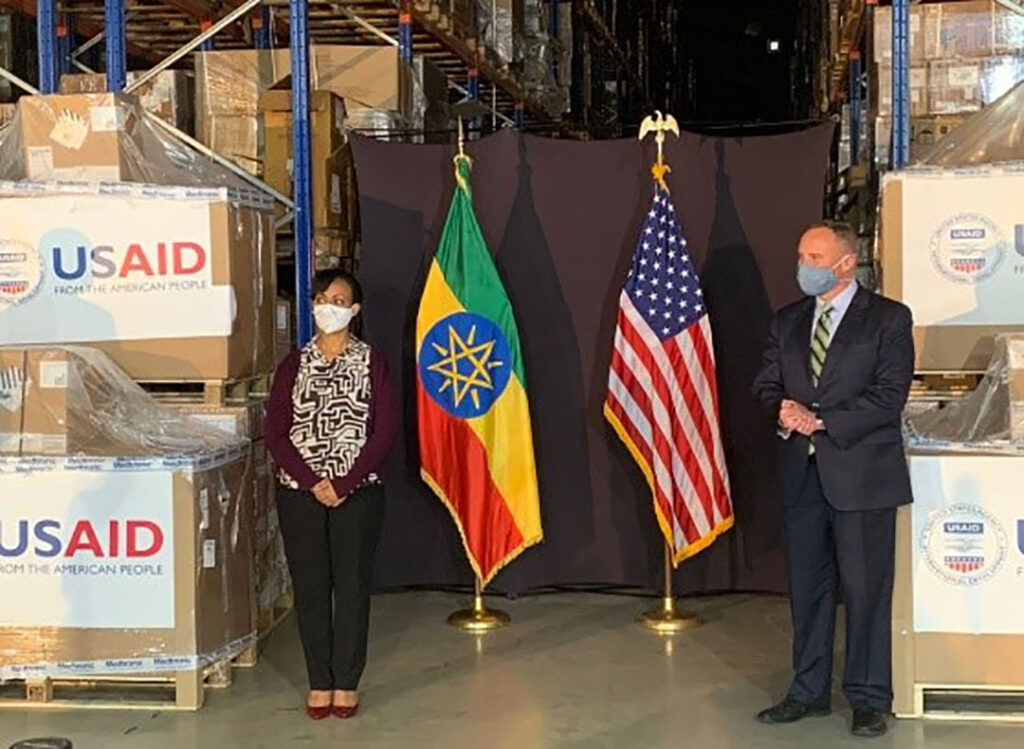ADF STAFF
Making good on an April pledge, the U.S. government donated 250 ventilators to Ethiopia as COVID-19 cases began to surge.
“Ethiopia appreciates President Donald Trump’s generous contribution and that of the American people to our citizens,” Ethiopian Health Minister Lia Tadesse said. “The United States and Ethiopia share a long history of cooperation, and the support of the [U.S.] over the years has helped strengthen and enhance the Ethiopian health system.”
Before the pandemic struck, Ethiopian physician Rediet Libanos told Agence France-Presse (AFP) that she had used a ventilator only once in four years – to treat a patient who suffered a hemorrhagic stroke.
After the first COVID-19 case was confirmed in the Horn of Africa nation in March, Libanos said she and her colleagues quickly learned to use the breathing machines that can enhance oxygen levels in patients whose lungs are failing. Libanos said she first practiced on a rubber dummy, then visited clinics to observe how ventilators are used in real medical situations.
“I will be on the front lines of (Ethiopia’s COVID-19 response) so I need to be skilled in how to use this machine,” Libanos told AFP.
Ethiopia had 450 ventilators – 54 designated for COVID-19 patients – when the pandemic struck, Yakob Seman, director general of medical services at Ethiopia’s health ministry told AFP. The country has a population of over 100 million.
The recent contribution of ventilators reinforces the U.S. government’s “unwavering commitment to the Ethiopian people,” said Michael Raynor, U.S. Ambassador in Ethiopia.
“This donation is a critical addition to the billions of dollars in resources and expertise that the American people have invested in Ethiopia’s health system in recent years,” Raynor said. “I am honored to … hand over this new equipment and to continue our work together.”
According to the Africa Centres for Disease Control and Prevention, Ethiopia has reported nearly 30,000 confirmed COVID-19 cases and more than 500 deaths as of August 16, but officials there reported more than 9,000 new cases during two weeks from late July to early August.
Some Ethiopians fear that people have grown complacent about taking safety measures to contain the virus.
“People’s fear about COVID-19 has been eroding over time,” Benyam Worku, an assistant professor at Addis Ababa University’s School of Medicine, told AFP. “But it doesn’t seem likely that we have escaped COVID. Most probably it has been a long wait [for the virus to hit Ethiopia], and now the wait is over.”
The situation has frustrated some health workers in Addis Ababa, the nation’s capital, where cars with mounted loudspeakers routinely drive through congested areas and play recorded messages to remind people to wear masks, frequently wash their hands and practice social distancing.
Some say the messages get buried in the white noise of urban life.
“We teach people to apply these precautions,” Wondimu Taye, a city health communications officer, told AFP, “but some people put their masks in their pocket and wear it only when our teams are around.”

